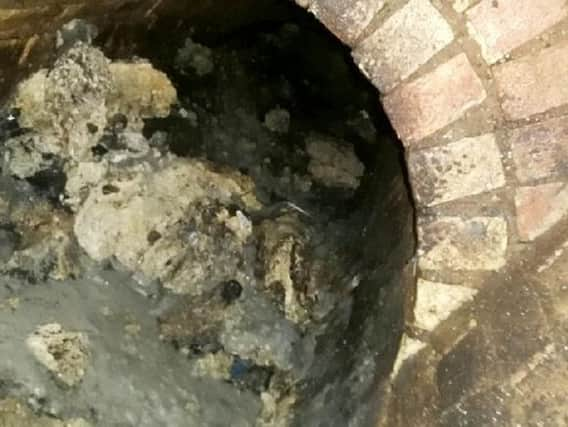Here's why you shouldn't put oil down the sink


The gigantic monster of wet wipes, nappies, fat and oil has plugged the Victorian sewers and is longer than twice the length of two Wembley football pitches.
Engineers have now started their three-week war against the disgusting fatberg using high pressure hoses to dislodge the muck which is then sucked up into a fleet of tankers.
Advertisement
Hide AdAdvertisement
Hide AdThames Water's head of waste networks Matt Rimmer said: "This fatberg is up there with the biggest we've ever seen.
"It's a total monster and taking a lot of manpower and machinery to remove as it's set hard.
"It's basically like trying to break up concrete.
"It's frustrating as these situations are totally avoidable and caused by fat, oil and grease being washed down sinks and wipes flushed down the loo."
Fattest fatberg
The last huge fatberg, which was Britain's biggest until now, was discovered in Kingston-upon-Thames, south west London, in 2013.
Advertisement
Hide AdAdvertisement
Hide AdThe new blockage will be attacked by an eight-strong crew using high-powered jet hoses to break up the mass before sucking it out with tankers, which take it away for disposal at a recycling site in Stratford.
CCTV camera inspections showed the 47 inch high by 27 in wide sewer 11.5 feet below the ground to be totally blocked by the fatberg.
Work will continue throughout September until the sewer is clear.
Matt added: "We check our sewers routinely but these things can build up really quickly and cause big problems with flooding, as the waste gets blocked.
Advertisement
Hide AdAdvertisement
Hide Ad"It's fortunate in this case that we've only had to close off a few parking bays to get to the sewer.
"Often we have to shut roads entirely, which can cause widespread disruption - especially in London."
Thames Water spends around £1 million a month clearing blockages from its sewers, all caused by items like fat, wipes, nappies, cotton buds, sanitary products and condoms.
They have launched a new campaign called 'Bin it - don't block it' in a bid to reduce the amount of rubbish put down sinks and toilets.
Advertisement
Hide AdAdvertisement
Hide AdMatt said: "When it comes to preventing fatbergs, everyone has a role to play.
"Yes, a lot of the fat comes from food outlets, but the wipes and sanitary items are far more likely to be from domestic properties.
"The sewers are not an abyss for household rubbish and our message to everyone is clear - please 'Bin it - don't block it'."